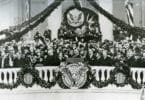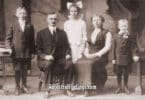Early Life and Background
Zachary Taylor was born in Orange County, Virginia, on November 24, 1784. He was the third of nine children born to Richard and Sarah Dabney Strother Taylor. When Zachary was young, the Taylor family moved to Kentucky, settling on a plantation near Louisville. This move to the western frontier exposed Taylor to a life of rugged independence and self-reliance.
Taylor received a limited formal education due to the frontier conditions but was taught basic literacy and arithmetic by his mother and private tutors. His upbringing in the frontier regions of Kentucky and later Louisiana instilled in him a deep sense of duty, resilience, and a no-nonsense approach to life.
Military Career
Taylor’s military career began in 1808 when he received a commission as a first lieutenant in the U.S. Army. He quickly rose through the ranks, demonstrating his leadership and bravery in various conflicts. Taylor served in the War of 1812, the Black Hawk War, and the Second Seminole War. His success in these conflicts earned him a reputation as a tough and capable leader.
Taylor’s most significant military achievements came during the Mexican-American War. He was stationed in Texas in anticipation of a conflict with Mexico over the annexation of Texas. When war broke out in 1846, Taylor led American forces to several key victories, including the Battles of Palo Alto, Resaca de la Palma, and Monterrey. His most famous victory came at the Battle of Buena Vista in 1847, where his smaller, outnumbered force repelled a much larger Mexican army under General Antonio López de Santa Anna. Taylor’s success in the war made him a national hero and earned him the nickname “Old Rough and Ready.”
Path to the Presidency
Taylor’s military fame propelled him into the national spotlight and made him an attractive presidential candidate. Despite having no prior political experience, Taylor was courted by both the Whig and Democratic parties. He eventually accepted the Whig nomination in 1848, running on a platform emphasizing his military service and national unity while avoiding divisive political issues like slavery.
The 1848 election saw Taylor facing off against Democrat Lewis Cass and former President Martin Van Buren, who ran as a Free Soil candidate. Taylor’s popularity as a war hero and his image as a man of the people helped him secure a narrow victory.
Presidency (1849-1850)
Domestic Policy and Slavery
Taylor’s presidency occurred during a period of intense national debate over the expansion of slavery into newly acquired territories from the Mexican-American War. Although a slaveholder himself, Taylor adopted a moderate stance on the issue, favoring the admission of California and New Mexico as free states, which would limit the expansion of slavery.
Taylor’s position put him at odds with many Southern leaders who supported the extension of slavery into the new territories. Despite this, Taylor was determined to maintain national unity and avoid sectional conflict. He believed that the territories should decide the issue of slavery for themselves through popular sovereignty.
The Compromise of 1850
During Taylor’s presidency, one of the most significant issues was the Compromise of 1850, a series of legislative measures to resolve the sectional tensions over slavery. The compromise included provisions for the admission of California as a free state, the establishment of territorial governments in New Mexico and Utah without immediate decisions on slavery, the abolition of the slave trade in Washington, D.C., and the introduction of a stricter Fugitive Slave Law.
Taylor initially opposed the compromise, particularly the Fugitive Slave Law, believing it would exacerbate sectional tensions. He instead favored immediate statehood for California and New Mexico without restrictions on slavery. However, Taylor’s sudden death in July 1850 prevented him from implementing his policies, and his successor, Millard Fillmore, ultimately signed the compromise into law.
Death and Legacy
Zachary Taylor’s presidency was abruptly cut short when he fell ill after attending a Fourth of July celebration in 1850. He died on July 9, 1850, just 16 months into his term, making his presidency one of the shortest in American history. The exact cause of his death has been the subject of speculation and conspiracy theories, but most historians believe he died of acute gastroenteritis.
Despite his brief tenure, Taylor’s presidency occurred at a pivotal moment in American history. His moderate stance on slavery and commitment to preserving the Union set the stage for the Compromise of 1850, which temporarily eased sectional tensions. Taylor’s military service and reputation as a national hero also contributed to his enduring legacy.
Personal Life and Character
Zachary Taylor married Margaret Mackall Smith in 1810, and the couple had six children. Margaret, known as “Peggy,” preferred a private life and largely avoided the social and political scene in Washington, D.C. Their daughter, Sarah Knox Taylor, married Jefferson Davis, who would later become the President of the Confederate States of America, though Sarah tragically died three months after their wedding.
Taylor was known for his straightforward, no-nonsense demeanor and strong sense of duty. His military background shaped his approach to leadership, emphasizing discipline, resilience, and pragmatism. Taylor’s modesty and lack of political ambition distinguished him from many of his contemporaries, and he was often described as a reluctant politician who viewed public service as a duty rather than a career.
Interesting Aspects of Taylor’s Presidency
A Reluctant Politician
One of the most intriguing aspects of Zachary Taylor’s presidency was his reluctance to enter politics. Unlike many of his predecessors, Taylor had no political experience and expressed little interest in the office before his nomination. His sense of duty and national service drove him to accept the Whig nomination, and his presidency reflected his pragmatic and nonpartisan approach to governance.
Taylor’s Relationship with Slavery
Although Taylor was a slaveholder, his stance on the expansion of slavery into new territories was moderate and somewhat progressive for his time. He opposed the extension of slavery into California and New Mexico, believing that it would lead to unnecessary conflict. This position alienated many Southern leaders but demonstrated Taylor’s commitment to preserving the Union.
The Mysterious Death
Taylor’s sudden death in 1850 has been the subject of speculation and conspiracy theories. Some have suggested that he was poisoned due to his stance on slavery and the Compromise of 1850. In 1991, his remains were exhumed and tested for arsenic poisoning, but the results were inconclusive. The most widely accepted explanation is that he died of natural causes, likely acute gastroenteritis.
Legacy and Impact
Zachary Taylor’s legacy is complex, shaped by his military service, moderate political stance, and untimely death. His presidency, though brief, occurred during a critical period in American history, and his efforts to address the issue of slavery in the new territories helped set the stage for the Compromise of 1850.
Taylor’s military achievements and reputation as a national hero have endured. He is often remembered for his bravery and leadership on the battlefield. His pragmatic approach to governance and commitment to national unity continue to be recognized as significant contributions to American history.
Despite his short time in office, Taylor’s impact on the nation’s trajectory was considerable. His stance on slavery and territorial expansion influenced the political landscape of the time and contributed to the ongoing debate over the future of slavery in America.
Conclusion
Zachary Taylor’s life and presidency offer a fascinating glimpse into a critical period of American history. From his early days on the Kentucky frontier to his rise as a national military hero and his brief tenure as president, Taylor’s journey is a testament to the values of duty, resilience, and pragmatism.
While his presidency was marked by significant challenges and was tragically cut short, Taylor’s efforts to address the contentious issue of slavery and his commitment to national unity left a lasting impact. His legacy as a soldier and a statesman continues to be remembered and celebrated, reflecting the enduring complexities and challenges of American leadership during a pivotal era.
These books provide a comprehensive and detailed understanding of Zachary Taylor’s life, military career, and presidency, offering readers valuable insights into this important figure in American history.
Zachary Taylor: Soldier, Planter, Statesman of the Old Southwest by K. Jack Bauer
This comprehensive biography by K. Jack Bauer offers a detailed account of Taylor’s life, from his early years and military career to his brief presidency. Bauer thoroughly analyzes Taylor’s character, leadership style, and impact on American history.
Old Rough and Ready: The Life and Times of Zachary Taylor by Nathan Aaseng
Nathan Aaseng’s biography provides an accessible and engaging narrative of Taylor’s life. It focuses on his military exploits and role in the Mexican-American War and offers valuable insights into Taylor’s leadership and his journey to the presidency.
Zachary Taylor: The 12th President, 1849-1850 by John S.D. Eisenhower
Part of The American Presidents Series, this concise biography by John S.D. Eisenhower (the son of President Dwight D. Eisenhower) explores Taylor’s presidency, military career, and personal life. The book provides a balanced overview of Taylor’s contributions and legacy.
Zachary Taylor by John Eisenhower and David Eisenhower
This biography by John and David Eisenhower delves into Taylor’s life and career, offering insights into his military service and his time as president. The authors provide a well-rounded portrait of Taylor, highlighting his strengths and challenges.
Zachary Taylor: Soldier and President by Holman Hamilton
Holman Hamilton’s two-volume biography is a detailed and scholarly account of Taylor’s life. The first volume covers his military career, while the second focuses on his presidency and political achievements. Together, these books offer an in-depth exploration of Taylor’s life and legacy.






